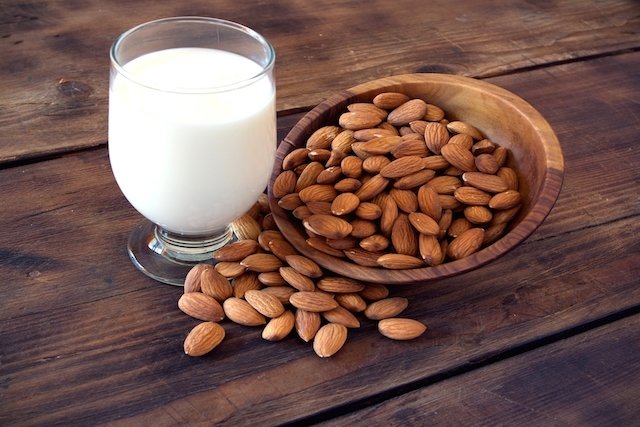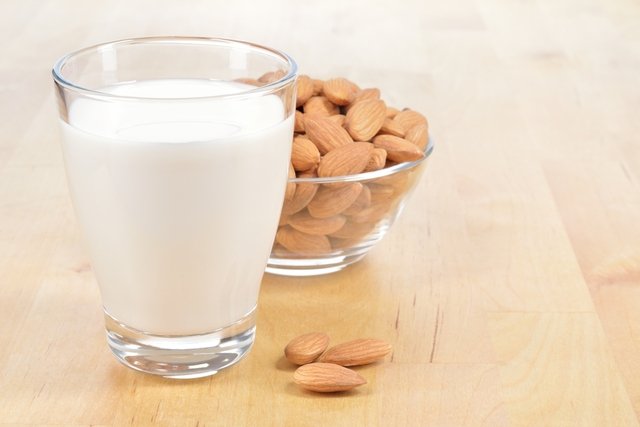Almond milk is a vegetable drink, prepared from a mixture of almonds and water as the main ingredients, and is widely used as a substitute for animal milk, as it does not contain lactose, and in weight loss diets, as it provides few calories.
This plant-based drink is rich in healthy fatty acids and low-glycemic carbohydrates. It also provides other important nutrients for health, such as calcium, magnesium, zinc, potassium, vitamin E and B vitamins.
Almond milk can be consumed for breakfast with granola or cereal, when preparing pancakes and even to accompany coffee. It can also be used to prepare fruit smoothies and to prepare cookies and cakes, for example.

Health benefits
The benefits that almond milk can bring to your health are:
- Help you lose weight, since each 100 mL contains only 19 kcal;
- Regulate blood glucoseas it is a drink with a low glycemic index, that is, it slightly raises blood glucose after ingestion (as long as it is prepared at home, as some industrialized products may contain added sugar);
- Prevent osteoporosis and take care of the health of your teeth, as it is rich in calcium and magnesium;
- Help prevent cardiovascular diseases, as it is rich in healthy monounsaturated and polyunsaturated fats that help take care of heart health. Furthermore, some studies indicate that it can help reduce LDL cholesterol (bad cholesterol) and triglycerides;
- Prevent premature agingas it contains vitamin E, with antioxidant properties that prevent cell damage caused by free radicals, caring for the skin and preventing the formation of wrinkles;
- Excellent option for people with lactose intolerance or allergies to cow’s milk proteinsoy allergy, and by vegetarians and vegans.
Unlike cow’s milk, almond milk provides little protein, so it may not be the best option for growing children or anyone looking to increase muscle mass. In these cases, the ideal is to consult a nutritionist for personalized advice.
Nutritional value of almond milk
The following table provides nutritional information for 100 mL of almond milk:
You can buy almond milk, which is actually an almond drink, in supermarkets and health food stores. Alternatively, you can make almond milk at home to make it more affordable.
How to make almond milk at home
To make almond milk at home you need:
Ingredients:
- 2 cups of raw, unsalted almonds;
- 6 to 8 cups of water.
Preparation mode:
Leave the almonds to soak overnight. The next day, throw the water away and dry the almonds with a kitchen towel. Place the almonds in a blender or processor and blend with the water. Strain with a fine cloth strainer and it is ready to drink. If it is made with less water (about 4 cups) the drink becomes thicker and can therefore replace cow’s milk in several recipes.
In addition to swapping cow’s milk for almond milk, for a healthier and more environmentally friendly life you can also swap plastic pots for glass ones.
Who shouldn’t consume almond milk
Almond milk should be avoided by people who are allergic to tree nuts. Furthermore, it should not be given to children under 1 year of age, as it contains few calories and is low in proteins and other nutrients necessary for the baby’s growth and development.
See what other healthy changes you can adopt to avoid diseases such as diabetes, cholesterol, triglycerides and to have a fuller life in this video with nutritionist Tatiana Zanin:
Bibliography
- Soumik Kalita; Shweta Khandelwal. Almonds and Cardiovascular Health: A Review. Nutrients. 10. 1-10, 2018
- Jozaa Zaidan Al Tamimi. Effects of Almond Milk on Body Measurements and Blood Pressure. Food and Nutrition Sciences. 7. 466-471, 2016
- Alozie Yetunde E; Udofia, Ukpong. Nutritional and Sensory Properties of Almond (Prunus amygdalu Var. Dulcis) Seed Milk. World Journal of Dairy & Food Sciences . 10. 2; 117-121, 2015

Sign up for our newsletter and stay up to date with exclusive news
that can transform your routine!
Warning: Undefined array key "title" in /home/storelat/public_html/wp-content/plugins/link-whisper-premium/templates/frontend/related-posts.php on line 12
Warning: Undefined array key "title_tag" in /home/storelat/public_html/wp-content/plugins/link-whisper-premium/templates/frontend/related-posts.php on line 13





